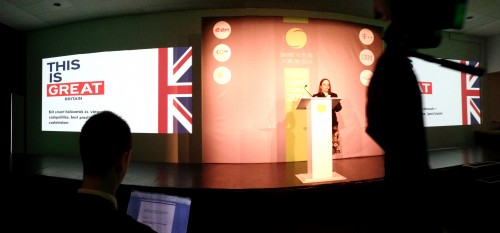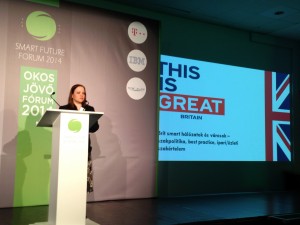4th June 2014 Budapest, Hungary
How ‘smart’ do you think the UK is?
Much more than most know. So I was glad to be able to publicise the UK’s smart credentials recently. But what are the smart grid and smart cities?
Smart grids are the electricity transmission network enabled by digital technology for two-way communication between the utility and its customers, and the sensing along the transmission lines. It allows feeding in locally generated renewable energy, better control over consumption such as taking advantage of time-of-use tariffs and more effective repair of technical problems such as outages. Smart cities are also made smart by using digital technology that allows real time data gathering from the urban environment to enhance the quality of operational information management for a wide range of functions from transport management, to street lighting, or water and energy management, to remote access to services.

“Did not know the UK had this much to offer on ‘smart’ ” – the chief organiser after the Smart Future Conference told me. I must admit, I did not know it either when I happily accepted the invitation to speak at the conference. I have only realised the abundance of information on the UK’s smart experience when I started to collect material to prepare for my presentation. The organisers asked me to cover not just smart solutions in the energy sector, but smart cities.
As I started to read myself into the subject, I came across some interesting facts. Did you know that the EU Joint Research Council survey found that the UK was leading smart grid research and demonstration in Europe? Among other things, this will include equipping 27 million homes with smart meters between 2015 and 2019. Or did you know that London ranks as the 5th smart city in the world according to a book by L. Hunter Lovins and Boyd Cohen, titled Climate Capitalism: Capitalism in the Age of Climate Change? They rank cities on a number of indications and praised London for its efforts in congestion management, the green Olympics, entrepreneurship, and free wifi access.
The conference participants came from the IT, energy and municipal sectors. So I wanted to highlight common lessons relevant for all these stakeholders. Thus I highlighted two things: the importance of a supportive policy and market environment and that much of the smart technology is already available, what we need more is apps.

The audience was impressed by Ofgem, the UK energy regulator’s innovative incentives for energy distribution companies, its vision and route map; the information on UK demo projects on the Energy Networks Association’s smarter networks portal; the organisations, which support dialogue among government, industry and consumers; and the economic impact study commissioned by Smart Grid GB.
The conference gave me an opportunity to introduce the UK’s world class smart industry cluster and best practice like that of Glasgow, which hosts the Technology Strategy Board’s Future Cities Demonstrator programme, or Bristol, which was selected as Europe’s Green Capital 2015. Having read BIS and Arup’s study on UK competitive advantages in the supply chain, I wanted to do a bit of commercial diplomacy. Quite a few Hungarian companies represented at the adjacent exhibition or attending the presentation asked for assistance to find UK partners. I was proud of myself that I have foreseen these requests and included a series of company listings by capability groupings in my presentation. These lists set out UK companies with a specific capability in a given smart sector. Thanks to UKTI Low Carbon Group I had a wide range of capability listings and I could please the audience with this practical help.
I hope my adventures into ‘smart’ will not stop here and I will be able to assist with building partnerships among UK and Hungarian partners. I will seek opportunities for that. Even until then I will visit the interactive future cities exhibition at The Crystal in the Royal Victoria Docks when I am in London next.
The views and opinions expressed in this article are those of the authors and do not necessarily reflect the official policy or position of the British government.

